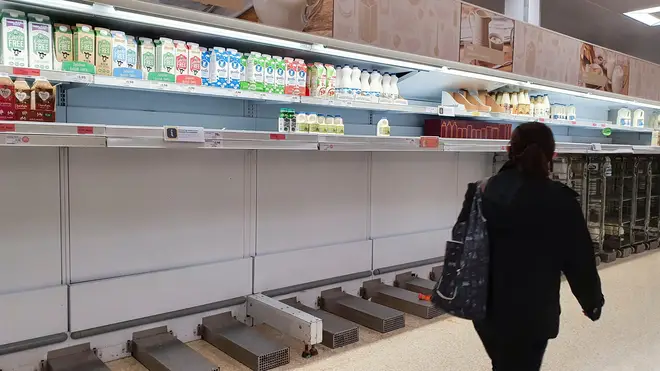
Iain Dale 7pm - 10pm
9 October 2021, 13:39 | Updated: 9 October 2021, 14:01

Shoppers are facing empty shelves in supermarkets with one in six claiming they have been unable to buy essential food in the past two weeks, according to the latest official data.
17% of British adults reported that they had not been able to buy essential food items because they were not available in shops, according to the latest ONS figures.
Around 1 in 7 (15%) were unable to buy fuel, and around 1 in 4 (23%) reported that they had not been able to buy other non-essential food items.

Distribution expert calls on easing of immigration rules
57 per cent of people reported that everything they needed had been available.
Pictures on social media today show aisles at some supermarkets stripped bare of meat, fruit and frozen goods.
Customers have also been seen pushing trolleys laden with toilet roll and water bottles ahead of Christmas.
READ MORE: Energy crisis: Factory production could come to halt as gas prices soar
Rising energy costs have sparked fears of a difficult winter and industry leaders are calling on the government to take action "right now."
The Energy Intensive Users Group (EIUG) chair Dr Richard Leese said he put forward three "technical" proposals to the Government to avoid interruption to supply chains.
It comes after he attended a meeting with Business Secretary Kwasi Kwarteng and other representatives of energy intensive industries to discuss the wholesale gas crisis on Friday afternoon.
Dr Leese said on Saturday morning: "All across the energy intensive industries, they're equally affected. We've seen the curtailment in production in the steel and fertiliser sector - that's had a knock-on impact into the supply chains in the industrial supply chains and domestic supply chains.
"What we've done is lay out to Government a winter package of measures that we think is needed to prevent those interruptions in supply chains occurring again.
The EIUG said it "welcomed" the opportunity to meet with Mr Kwarteng to discuss practical solutions to the issue.
Dr Leese, who said the Business Secretary "took on board" the three proposals put to him, advised the Government to work alongside the industry.
His first proposal was for the Government to look at "cost containment measures" over winter, as relief for the industry is "not widespread".
He went on to say: "Our second measure is to look at network costs within the UK. Network costs are distributed differently to other European countries in terms of energy intensive industries getting a higher proportion of the network costs, and that's something within Ofgem's gift.
There are reports today the Government is planning to introduce new charges on gas.
A new strategy will be published before the Cop26 climate conference in Glasgow next month, committing the Government to cut the price of electricity and impose a levy on gas bills, The Times has reported.
The Government will reportedly release a series of consultations before going ahead with the plan, which is likely to start in 2023 and could add £170 a year to gas bills.
Overseas, Lebanon's electricity grid has reportedly shut down completely after the country's two biggest power stations ran out of fuel.
The entire country appears to be without electricity and officials say it could be a few days before the issue is resolved.
There have been shortages of gas across the globe as demand rose sharply after the pandemic, sending prices through the roof.